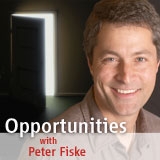机遇:灾难的主宰

线性成功的神话
很多人都有一个被误导的信条,认为一个成功的职业生涯是稳定的,可预见的且没有挫折的,可以稳定地从毕业生到博士后(再到博士后,再到博士后… …)到助理教授,终身任职,全职教授,荣誉退休教授——或如此继续。 
在现实中,几乎所有的科学家们都会遇到挫折和奇特的事情,扰乱时间和职业生涯的继续。心理学家和职业顾问发现人们对挫折的应变和适应能力是他们一生幸福和事业成功的一大预示。
有一个类似的成功创业的神话,总所周知,一家公司实现一个巨大的成功是因为完美地执行一个辉煌而由又前瞻性的业务计划,有关现在已经成功的公司创始人的访谈强化这一点,他们热衷于鼓吹精彩的行动和必然的成功,很难得听到一位成功的企业家承认进入弯路和挫折,使企业在它历史上某个时刻陷于困境。
那么,如果挫折和灾害会发生在许多成功的创业过程是真的,这是否意味着你应该去寻找挫折和灾害?当然不是,挫折从来都是不愉快的,但是,有些人是那么害怕失败,以至于他们从来没有迈出他们的舒适地带——这可能是一个比寻找灾难更大的错误。即使是一个小小的挫折挡住他们的去路,这种人往往被完全挫败,无法辨别并追寻乌云之后的光亮。
挫折来临时,你可能不知道它将是你职业道路上一个暂时的干扰或是一个震撼的改变,但你可以想办法减少这类事件造成的情感创伤,增加将挫折转化为优势的可能性。首先,打开你的眼睛和耳朵。许多挫折都会先给出警告。其次,保持一个强大的专业网络。我的一名导师说,他定义的“心理健康”是感觉自己可以选择。最后,保持一种良好的态度。面对挫折感到愤怒和失败是很自然的,但纠缠于挫折的不义,往往让您专注于过去,而没有注意到可以改善境况的新机遇。
Peter Fiske是有博士学位的科学家和RAPT企业共同创始人,该企业是位于加利福尼亚州的弗雷蒙的一个技术公司。他是《把你的科学带到工作中》的作者,并与Genff Davis博士共同创作一个跟影响科学就业的科学政策,经济,教育等措施有关的博客(phds.org)。Fiske与他的妻子和两个女儿一起生活在加利福尼亚的奥克兰,并经常作关于科学家职业发展的报告。
The myth of linear success
There's a misguided belief, shared by many, that a successful career is stable, predictable, and free of setbacks. One moves in a steady progression from grad student to postdoc (to postdoc, to postdoc … ) to an assistant professorship, tenure, full-professorship, emeritus-–or so the story goes.
In reality, nearly all scientists encounter setbacks, singularities that disturb the local time-career continuum. Psychologists and career counselors have found that people's ability to cope with and adapt to setbacks when they occur is a major predictor of overall happiness and professional success.
There is a similar myth about successful business ventures. It's often assumed that a company that has grown to be a huge success did so because of flawless execution of a brilliant, forward-think business plan. Interviews with now-successful company founders reinforce this idea; they are eager to advertise the brilliant moves and their inevitable success. It is rare to hear a successful entrepreneur admit to the blunders and setbacks that imperil almost every venture at some point in its history.
So if it's true that setbacks and near-disasters occur in so many successful ventures, does that mean you should seek out setbacks and near-disasters? Of course not. Setbacks are NEVER pleasant. But some people fear failure so intensely that they never move outside of their comfort zone--and that may be an even bigger mistake than seeking out disaster. When even a small setback comes their way, such people often are totally devastated and unable to discern and pursue the shiny lining beyond the dark clouds.
You cannot know whether a setback, when it comes, will be a short-lived perturbation or a seismic shift in your professional future. But there are a few things you can do to reduce the emotional trauma of such events and increase the odds that a setback can be turned to your advantage. First, keep your eyes and ears open. Many setbacks are preceded by warning signs. Second, maintain a strong professional network. One mentor of mine said his definition of “mental health” was the feeling that you have options. Finally, keep a good attitude. The anger and frustration you feel when a setback arrives is natural. But dwelling on the injustice of the setback tends to keep you focused on the past and can prevent you from recognizing the new opportunities your revised situation offers.
Peter Fiske is a Ph.D. scientist and co-founder of RAPT Industries, a technology company in Fremont, California. He is the author of Put Your Science to Work and co-author, with Dr. Geoff Davis, of a blog (at phds.org) on science policy, economics, and educational initiatives that affect science employment. Fiske lives with his wife and two daughters in Oakland, California, and is a frequent lecturer on the subject of career development for scientists.





